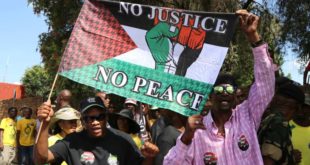If confirmed, the death of Abdelmalek Droukdal would be a blow to one of the terrorist group’s most successful and resilient affiliates.
The French military said on Friday that its forces in Mali had killed one of Al Qaeda’s longest-serving commanders in Africa, Abdelmalek Droukdal, who has led an affiliate of the terror network for more than a decade.
The killing of Mr. Droukdal, later confirmed by the U.S. Africa Command, is a setback for Al Qaeda’s operations in northwestern Africa. “A very big loss for them,” said Wassim Nasr, a French expert on the terrorist group who has interviewed its leaders.
In a statement on Twitter, Defense Minister Florence Parly of France wrote: “On June 3, the French armed forces, with the support of their partners, neutralized the emir of Al Qaeda in the Islamic Maghreb (AQIM), Abdelmalek Droukdal and several of his close associates, in the course of an operation in northern Mali.”
Col. Christopher Karns of U.S. Africa Command said the United States had provided the French with intelligence and surveillance aircraft to help with the mission. He did not comment on whether the raid had resulted in Mr. Droukdal’s death.
Mr. Droukdal, 50, was born in Algeria and fought the Soviets in Afghanistan before returning to his home country in the 1990s to take part in its vicious civil war. A university mathematics graduate and an Islamist, Mr. Droukdal rose through the ranks of the Salafist Group for Preaching and Combat, a local insurgent group that did little more than carry out gunfights with Algerian soldiers.
By the time he became the group’s commander in 2004, it was all but washed up, nearly out of money and recruits, with its remaining fighters hunkered down in caves. Mr. Droukdal then sent a secret message to Abu Musab al-Zarqawi, Al Qaeda’s leader in Iraq.
What followed next has been described as the terrorist version of a corporate merger.
Mr. Droukdal’s men pledged allegiance to the Qaeda terrorist brand in 2006 and quickly became the network’s most loyal partner in Africa, and one of its most lethal. Instead of skirmishes with Algerian troops, the group began carrying out a succession of suicide bombings, hitting targets that made clear their ambitions were no longer local. They included the headquarters of the United Nations in Algiers, which the group destroyed in 2007, killing dozens of people.
That same year, the group, now known as Al Qaeda in the Islamic Maghreb, expanded its area of operation beyond Algeria, a move that it signaled by gunning down a group of French picnickers in Mauritania.
Soon, Mr. Droukdal’s katibas, or battalions, were operating in Mauritania, Mali, Niger, Tunisia and Libya.
The group financed itself by kidnapping foreigners and extracting ransoms from their governments. In just five years, starting in 2008, the group netted $91 million.
Flush with cash in 2012, Mr. Droukdal’s foot soldiers, alongside two other rebel groups, invaded northern Mali and succeeded in seizing the country’s northern half, a territory they ruled much as Islamic State militants would later govern swathes of Iraq and Syria.
That marked a high point for the group, as Mr. Droukdal’s men and their associates held on to an Afghanistan-sized piece of territory for nearly a year, until the French military launched a ground invasion to take it back in 2013.
It also marked the beginning of a series of internal rifts. Moktar Belmoktar, who had headed one of Mr. Droukdal’s most active battalions, sent a scathing letter announcing that he was creating his own terrorist group and would be in direct touch with Al Qaeda, no longer interested in reporting to Mr. Droukdal, whom he portrayed as a meddlesome middle manager.
The deeper it pushed into sub-Saharan Africa, the bigger the internal difficulties that Mr. Droukdal’s group faced. Its commanders were all light-skinned Arabs, but their recruits included a growing number of dark-skinned Malians, Nigeriens, Senegalese and Nigerians who began resenting the leadership.
By 2014, having lost all the territory it once held, its ranks depleted by airstrikes and divided by internal quarrels, the group again looked like it was in its death throes.
But Mr. Droukdal showed his skill as a tactician, creating in 2017 a front organization that went by the acronym JNIM and was led by a Malian insurgent, Iyad Ag Ghali, an ethnic Tuareg. The group included in its command structure Amadou Koufa, also from Mali but from the Peul ethnic group, an ethnicity that spans the region.
Under the banner of this new group, which had a local face but remained under the command of Mr. Droukdal, Al Qaeda’s footprint spread deeply into West Africa.
That same year, a restaurant popular with expatriates was attacked in the capital of Burkina Faso, killing 18. Terrorists have attacked the Radisson Blu, the top hotel in Mali’s capital and a coastal resort in Ivory Coast. They have kidnapped hostages as far afield as Benin.
“This was his chef d’oeuvre,” said Mr. Nasr, the author of “The Islamic State, A Fait Accompli.” “It opened up an entire region to him.”
Throughout its rise, Al Qaeda in the Islamic Maghreb released videos and audios loudly touting its alliance to the global Qaeda network. But for years, officials in Washington were skeptical, insisting that the association was more public relations stunt than reality.
Yet in the buildings the militants had occupied in the Malian city of Timbuktu, thousands of pages of their internal documents were recovered by The Associated Press, including letters to Mr. Droukdal from Al Qaeda’s general manager, indicating direct communication. And once the terabytes of data found on Osama bin Laden’s computer in Pakistan was declassified, analysts were able to see that he had maintained a yearslong correspondence with Mr. Droukdal.
“If confirmed to be true, the death of Droukdal removes one of the most senior and most durable leaders of AQIM, a longstanding Al Qaeda affiliate,” said Nicholas Rasmussen, the former head of the National Counterterrorism Center in Washington. “Droukdal remained doggedly loyal to Al Qaeda’s senior leadership.”
 GhArticles.com Every News in Detail
GhArticles.com Every News in Detail



